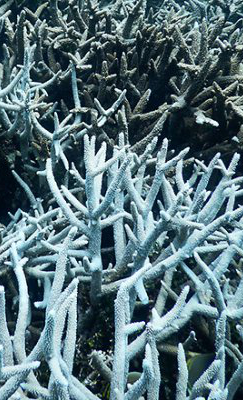Reef risks danger listing
 The UN has again raised concerns over the state of the Great Barrier Reef.
The UN has again raised concerns over the state of the Great Barrier Reef.
Following a UN-backed mission to the Great Barrier Reef, experts have concluded the world’s largest coral reef system should be placed on the list of world heritage sites in danger.
Climate change is a “serious challenge” to the values that saw the reef added to the world heritage list in 1981.
The full report is accessible here.
Attempts to reduce pollution running into the reef’s waters from farming and grazing onshore have not been successful, and more investment is needed to meet water quality targets, the report says.
The scientists’ recommendation to place the Reef on a list of world heritage sites “in danger” will be considered alongside responses from the Queensland and federal governments before UNESCO makes a formal recommendation to the world heritage committee.
The UN’s 10-day Reef mission happened at the request of former federal environment minister Sussan Ley, after the former government successfully avoided UNESCO’s 2021 recommendation to put the reef on the “in danger” list.
The mission occurred in March, just two months before the defeat of the Morrison government. The final mission report was only published this week after a six-month delay. It was meant to be released at a meeting chaired by Russia, but this was delayed when Russia invaded Ukraine earlier this year.
The report makes 10 priority recommendations that need to be addressed “with utmost urgency”.
The recommendations could “drastically improve [Australia’s] ability to ensure and advance the conservation of the property,” and retain its “outstanding universal value” for future generations, the report says.
It calls on the current government’s Reef 2050 plan to be strengthened before the end of this year to include “clear government commitments to reduce greenhouse emissions consistent with the efforts required to limit the global average temperature increase to 1.5C above pre-industrial levels”.
The Albanese government notes that it has legislated an improved national target to cut greenhouse gas emissions by 43 per cent from 2005 levels by 2030, and reach net zero by 2050.
It also announced $1.2 billion in funding to continue work to improve water quality and research on the resilience of corals and reefs.
“The resilience of the property to recover from climate change impacts is substantially compromised, in particular - but not exclusively - due to degraded water quality,” the report says.
Among the UN report’s recommendations is a call for the Queensland state government to accelerate the rollout of its sustainable fisheries strategy and to phase out the use of gillnets in the marine park. The state set aside $270 million to water quality work in its last budget.
“Despite the unparalleled science and management efforts made by [Australia] in recent years, the [outstanding universal value] of the property is significantly impacted by climate change factors,” the report says.
Shifting ocean conditions caused widespread bleaching of corals in 1998, 2002, 2016, 2017, 2020 and 2022. The UN-backed scientists were on the Reef for the first mass bleaching to take place during a La Niña year, which typically keeps ocean temperatures cool enough to protect corals.
The reef is likely to face bleaching again this summer, the experts say.
UNESCO is preparing a new report on the state of the reef to include the findings of the mission and any responses from the state and federal governments. This report will also include formal recommendations made directly to the world heritage committee ahead of a meeting likely to take place in the first half of next year.








 Print
Print